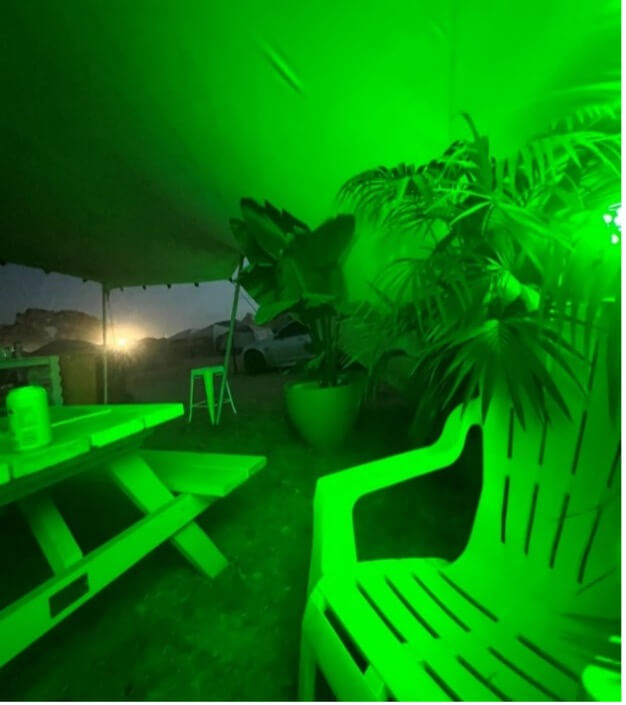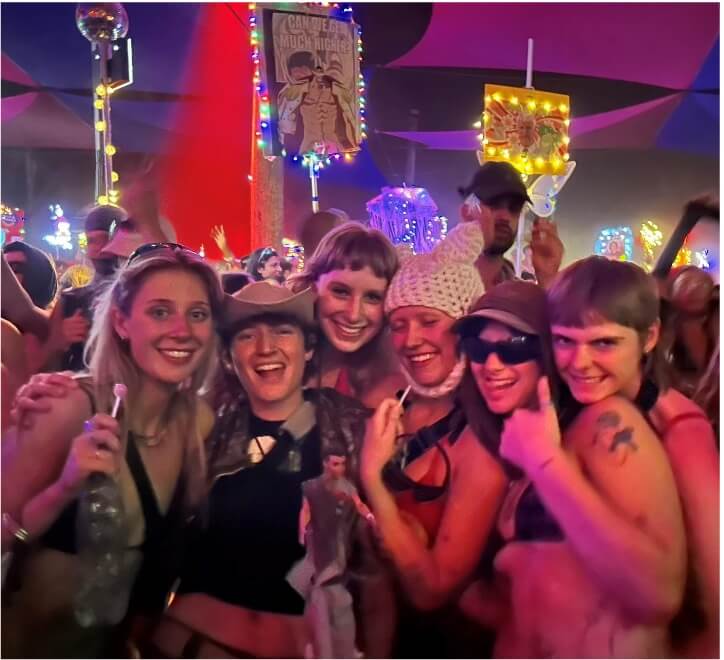Hi! My name’s Josie. I’m an intern at Music Victoria and work in music touring with Houston. I have been volunteering and working casually at music festivals for four years and I’m going to show you just how easy it can be so you can give it a go too!
Volunteering at festivals is an exciting and rewarding experience. Not to mention, the free ticket that typically accompanies volunteering can mean that you’re able to attend a festival you otherwise wouldn’t be able to. Think of all those dancing-filled weekends.
This piece will cover my experience volunteering during festivals, however, there are also many roles available in preparation of the event. These are typically more administrative in nature and require more commitment, such as social media, newsletters, stakeholder liaison, etc. If you’re interested in these positions, the process of sourcing a role is quite similar!

Pitch, 2024
Most festivals, particularly those with camping, have volunteers. Applications open a few months prior to the event, so be sure to look in advance.
If there’s a festival that you enjoy attending, or hope to attend, check out their website and look under some different tabs; ‘Work with us’, ‘Get involved’, ‘Volunteering’, etc. Be sure to follow their social media, as they are likely to post about applications opening. If there are no details available online, it may be a good idea to reach out to the organisers via email. Let them know why you’re interested and what you are looking to be involved in.
If you’re not sure where to start, or want to volunteer at a festival that you’re not already familiar with, do some research! ‘Visit Melbourne’ compiles a running list of Victorian festivals here and ‘All Festivals’ provides a diverse events calendar here. The Music Victoria jobs board will occasionally post volunteer roles at music events too. Have a look through them and see what stands out.

My friends and I enjoying an art installation by @patflanagan_design at Loch Hart Music Festival 2024.
Some festivals will have a waitlist of volunteers, others are unfortunately under-resourced. Regardless, there will be an application process that will involve providing a cover letter and resume.
Once you have been accepted into the volunteering role, organisers will be in contact with you regarding your shift position and roster.
The length and frequency of your shifts is dependent on the length of the festival. In my experience, a weekend camping festival will usually involve two, 4-hour shifts across the Friday - Sunday. Longer festivals may require more shifts, or the shifts may be longer.
Volunteer roles are diverse, and most of the time they will ask about your preference of role. Common volunteer positions involve ticket scanning/validation, working the gates, ecology (tending to the site’s cleanliness), helper hub/information, merchandise, crowd welfare and traffic control. You will usually be working alongside paid staff members who can offer some guidance; especially if you haven’t had much/any experience in the role.
The volunteer team plays a vital role in the event’s staffing. Engaging in volunteering comes with a level of responsibility and commitment to the team and other attendees. You are now expected to fulfil your time commitment and undertake the expectations of the role.


My view in the helper hub at Pitch 2024 (left), BTV 2023-24 main stage being built (right).
My biggest tip, plan ahead.
Organise a rough schedule for the weekend, particularly when you plan to sleep. With the added time commitment of your shifts, making sure you get a good amount of sleep can feel a little more challenging. If you’re going to enjoy the whole festival (and your week after) book it in!
Make sure you have easy and nutritious meals ready to go. My go to breakfast is yoghurt and granola, lunch is a salad roll and dinner is premade pasta, or something bought. And I’m quite frequently dancing with an apple and muesli bar in hand.

Apple on the dancefloor, BTV 2023-24.
Have a meet up spot and time organised with friends after your shifts. Don’t leave it to fate if you don’t have to (your phone’s reception is probably not attending the gig). And if your friends are also volunteering, the organisers may provide the option of requesting shifts together.
Some festivals will give you the option to give your shift time preferences, or to specify an act you don’t want to miss. Make the most of this! Check the set times if they’re available or listen to the acts if you're not familiar with them. Festival organisers and volunteer coordinators are usually quite accommodating. They want you to have a good time and enjoy the festival too!
To have an enjoyable shift, make sure you prioritise being able to work effectively and safely. This comes down to sleeping and eating around your shifts. The shift work can be fun and exciting, just make sure you’re looking after yourself.

With my pals at Strawberry Fields, 2023.
Volunteering has so many benefits (like the free ticket you’re receiving) and it’s a lot of fun! Your valuable contribution means you become part of the community putting on the event. This means meeting new people (networking, as well as creating some great new friends) and getting behind the scenes.
Getting experience in event/music work can sometimes be difficult, and volunteering involves plenty of on the ground activities. You gain valuable skills and work experience that could lead to paid gigs in the industry.
All my experiences volunteering have been very positive. I seriously recommend it to anyone. Many festivals simply couldn’t run without the contribution of volunteers; your involvement is helping the continuation of our music scene! Be proud of it.
Go get involved!

New Years Eve on the Hill, 2021-2022.